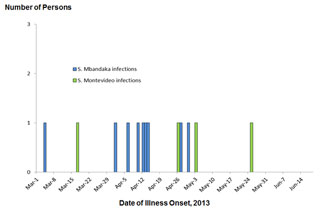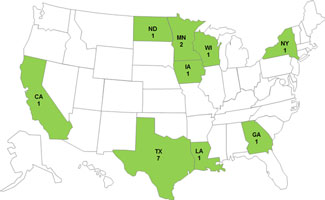Introduction
CDC collaborated with public health officials in several states and the U.S. Food and Drug Administration (FDA) to investigate a multistate outbreak of Salmonella Montevideo and Salmonella Mbandaka infections linked to tahini sesame paste distributed by Krinos Foods, LLC of Long Island City, New York.
Public health investigators used DNA “fingerprints” of Salmonella bacteria obtained through diagnostic testing with pulsed-field gel electrophoresis, or PFGE, to identify cases of illness that may be part of this outbreak. They used data from PulseNet, the national subtyping network made up of state and local public health laboratories and federal food regulatory laboratories that performs molecular surveillance of foodborne infections. These strains of Salmonella Montevideo and Salmonella Mbandaka had very rarely been seen before in PulseNet. Before this outbreak, these strains of Salmonella Montevideo and Salmonella Mbandaka had been reported only 29 and 4 times, respectively.
A total of 16 ill persons infected with the outbreak strains of Salmonella Montevideo (four persons) or Salmonella Mbandaka (12 persons) were reported from nine states. The number of ill persons identified in each state was as follows: California (1), Georgia (1), Iowa (1), Louisiana (1), Minnesota (2), New York (1), North Dakota (1), Texas (7), and Wisconsin (1).
Among persons for whom information was available, illness onset dates ranged from February 19, 2013 to May 25, 2013. Ill persons ranged in age from less than 1 year to 81 years, with a median age of 24 years. Sixty-three percent of ill persons were female. Among seven ill persons with available information, one person was hospitalized and died. Salmonella infection was not considered a contributing factor in this person’s death.
Investigation of the Outbreak
Epidemiologic, laboratory, and traceback investigations conducted by officials in local, state, and federal public health, agriculture, and regulatory agencies linked this outbreak to tahini sesame paste distributed by Krinos Foods, LLC of Long Island City, New York.
During routine product testing at a retail store, the Minnesota Department of Agriculture isolated Salmonella Montevideo from Krinos brand tahini sesame paste. Additional testing by the FDA isolated Salmonella Mbandaka from imported tahini sesame paste collected from shipments arriving from Turkey into the United States for distribution by Krinos Foods.
On April 28, 2013, Krinos Foods, LLC of Long Island City, New York, recalled its tahini sesame paste. On May 9, 2013,Krinos Foods expanded its recall to include additional expiration dates. The recalled lots have expiration dates from January 1, 2014 to June 8, 2014 and from October 16, 2014 to March 15, 2015.
A search of the PulseNet database identified ill persons with the same strains of Salmonella Montevideo and Salmonella Mbandaka. In interviews, these ill persons answered questions about foods eaten and other exposures during the week before becoming ill. Five (56%) of nine ill persons interviewed reported eating hummus. Three (75%) of four people (one infected with Salmonella Montevideo and two infected with Salmonella Mbandaka) who remembered the brand of tahini used in making the hummus reported consuming Krinos brand tahini sesame paste. Because tahini sesame paste is frequently used as an ingredient in many dishes, some ill persons may not know if they ate Krinos brand tahini sesame paste before their illness began.
Testing conducted by the Minnesota Department of Agriculture laboratory isolated the outbreak strains of Salmonella Montevideo and Salmonella Mbandaka and Salmonella Maastricht from opened jars of Krinos brand tahini sesame paste from two different ill persons’ homes (one person infected with Salmonella Montevideo and one infected with Salmonella Mbandaka). A search of the PulseNet database did not identify any ill persons with the strain of Salmonella Maastricht infection isolated from of the opened jars of Krinos brand tahini sesame paste.
On May 29, 2013, the FDA placed the Turkish importer of the sesame paste used to make Krinos brand tahini sesame paste on Import Alert. This means that sesame paste from this importer may be detained by FDA when offered for import into the United States unless the importer can show that it is not contaminated with Salmonella.
In May 2013, CDC was notified of an outbreak of 17 persons with Salmonella Mbandaka, Salmonella Montevideo, and Salmonella Maastricht infection in New Zealand investigated in November and December, 2012. Illnesses were also linked to tahini sesame paste imported from the same company in Turkey as was implicated in the outbreak in the United States. All three outbreak strains were isolated from unopened tubs of tahini sesame paste sourced from the warehouse of the New Zealand distributor.
The outbreak strains in the New Zealand investigation matched the Salmonella Montevideo and Salmonella Mbandaka outbreak strains identified in the outbreak in the United States. Additionally, the New Zealand outbreak strain of Salmonella Maastricht matched the Salmonella Maastricht strain isolated from opened jars of Krinos brand tahini sesame paste from two ill persons’ homes in Minnesota.
This particular outbreak appears to be over. However, many of these products have a long shelf-life, and they may still be in peoples’ homes. Consumers unaware of the recall could continue to eat these products and potentially get sick. Salmonella is an important cause of human illness in the United States. More information about Salmonella and steps people can take to reduce their risk of infection can be found on the CDC Salmonella Web Page.

